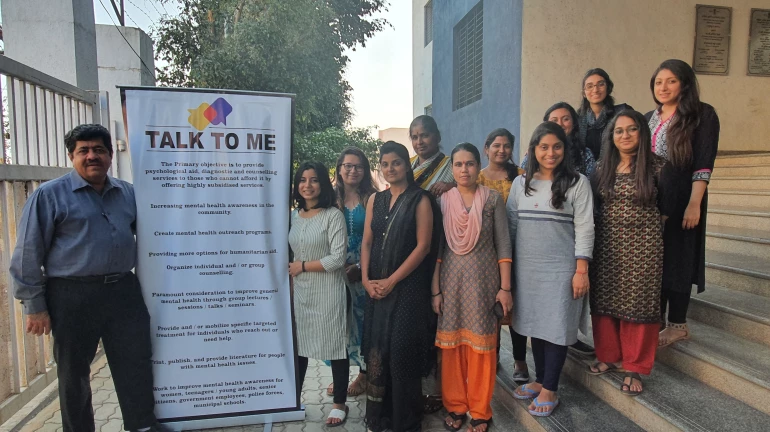
Talk To Me, a mental health not for profit organisation works to provide mental healthcare services to the most marginalised individuals. It was founded on the premise that in India there is a huge need for emphasis on mental health.
With one operational physical centre located at Mumbai’s Mahim, they aim to set up 14 more centres across Mumbai and Thane to enable ease of access.
Talk To Me, Founder, Mr Narendra Kinger during his conversation with Mumbai Live throws further light on this organization, “Professionals working in the field have realised that the extent of misinformation, lack of awareness, lack of focussed emphasis on basic mental health issues lead to suffering in the general population. When it comes to the marginalised sections, these aspects are even more severe. The government has focussed on physical health as it was seen as the priority. However, it is time that the focus is on mental health. Hence, Talk To Me has focussed all its energies towards this much-neglected aspect of health in India.”
Narendra Kinger, has 35 years of experience in the field of mental health as a practising Clinical Psychologist, Counsellor and Psychotherapist. He elucidated the psychological sufferings that deprived sections of society face. He said, “Mental health which includes a feeling of emotional wellbeing, is highly compromised in marginalised sections of any society. Poverty in itself brings a lack of dignity and impacts self-esteem which are crucial for emotional wellbeing. I have come to the understanding that if we take money out of the equation, we will create a level playing field for seeking emotional wellness. Also, unlike physical health; in the case of mental health, the services of a professional are required for extended periods. Often, the paucity of resources forces an economically deprived individual to abandon his treatment halfway. If we start creating a level playing and offer services for the poor, many who want to seek such help would come and benefit”.
He added, “Mental and emotional wellbeing can also have indirect spin-offs on the general health of society, for example, reduction of school dropouts, reduction of antisocial behaviour, reduction of gender-based violence, the list is endless in my opinion”.
Established in 2018, Talk To Me has conducted awareness sessions, free diagnosis and treatment for children and women in vulnerable situations across NGOs, and more recently for police personnel, who are working around the clock as critical frontline workers. Their key takeaways from this have been the realization that there is a great need for mental health services and help, in addition to individuals realising that they or people they know need such services. Their initiatives have exhibited that covert silence is gradually breaking thus more operational centres, or outreach programs are needed to start conversations on hitherto neglected aspects of mental health.
Apart from the neglected areas of mental health, there persists a general social stigma attached to mental health issues. Talk To Me, wishes to address this stigma by having continuous dialogue and conversations around it, to break the silence, considering that today mental health has come to the fore due to the COVID-19 pandemic.
Kinger mentions, “Nearly everyone has faced some challenges in terms of their mental wellbeing, a study spoke that 20 percent of all COVID-19 patients treated at various municipal facilities also had concomitant mental health issues. I believe this is just the tip of the iceberg”.
Further broaching the subject of the pandemic, Kinger believes that the psychological impact of coronavirus continues to be a neglected facet. Talk To Me has tried to address this through many of its initiatives.
Kinger elaborates, “We covered an entire police station located at Santacruz in Mumbai where we conducted interviews and assessments of all the policemen. We also interviewed the families of the police personnel, and have assessed those policemen who needed psychological testing. Many of the policemen required extended sessions due to the stress they faced whilst carrying out their duties during the pandemic, exhausting their natural ability to bounce back. We are also attempting to reach out to offer similar services to COVID-19 orphans.”
Additionally, according to Kinger, coronavirus has brought along with it mental health problems like anxiety, depression, boredom, lack of motivation, anhedonia, suicidal thoughts, poor attention and concentration. This he believes has increased conflicts with peers and family members and the desire to "give up" causing a significant increase in consumption of anti-anxiety, sleep medications, and antidepressants.
Speaking specifically talk about Mumbai, Kinger says that there are commonalities in the mental health sphere seen here, with the fast-paced lifestyle hampering the mental health of people. Kinger states, “Locals in the city spend hours commuting, children spend gruelling hours studying as adults expect them to be more than "miniature adults". Late-night weekends in Mumbai see people returning home in the wee hours and the consumption of alcohol and substances is seen as mandatory. Excessive spending beyond one's means is seen as a status symbol and splurging using EMIs are nuances that have invariable effects on one’s mental health, thus the city’s state of mental health is indeed a cause for concern”.
He adds, “To tackle these psychological challenges, we need to create awareness, acceptance, and start conversations around our mental health and its impact on ourselves, our loved ones and every other person that we interact with.”





